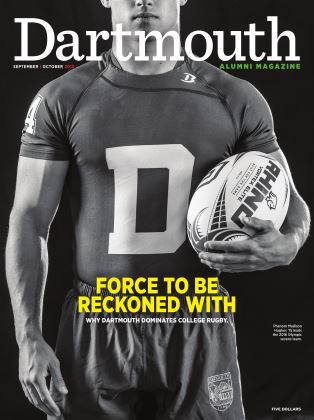Bright Idea
Engineer Anna Stork ’08 designs an inflatable lantern to aid disaster relief.
SEPTEMBER | OCTOBER 2015 ABIGAIL JONES ’03Engineer Anna Stork ’08 designs an inflatable lantern to aid disaster relief.
SEPTEMBER | OCTOBER 2015 ABIGAIL JONES ’03Young engineer designs an inflatable lantern to aid disaster relief.
ANNA STORK '08
MELISSA COOK '82
ANDRENNE & ANGILIQUE COLEMAN '13
GENE MACKLES '68
ALISON CROCKER '06
JASON DADAKIS '99
TWO WEEKS AFTER THE 2010 earthquake devastated Haiti, leaving more than 200,000 people dead and more than 1 million homeless, Stork showed up for the first day of a gradu- ate course that would change her ca- reer—and millions of lives. The class, a design studio she was taking for a master’s in architecture at Columbia, required students to brainstorm in- novations that might provide relief to Haitians. “Haiti was 80 percent with- out electricity before the earthquake and, after it, was in complete darkness at night. We read about the increase in kidnappings, rapes and theft because people were so desperate in tent cities,” says the Sherborn, Massachusetts, native. “We saw lots of food, shelter and medical supplies being sent down there, but there really wasn’t lighting.” Stork and Co-
lumbia classmate Andrea Sreshta de- cided to design an in- flatable, waterproof solar light that could be easily given out during disaster situ- ations. “Solar makes
so much sense because there’s so much sun in that area, so it can last a long time,” says Stork. “It’s also fairly inexpen- sive and can be distributed cost-effectively.” A few months later the pair filed for their first utility patent, and in 2011 they launched their company, LuminAID. Their Indiegogo crowd-funding campaign—which aimed to raise $10,000 to fund 1,000 lights—brought in five times that amount.
LuminAID’s solar light looks like an inflatable lantern, weighs just under 3 ounces and provides up to 16 hours of LED light. It’s waterproof and can recharge on the go. Once you’re done using it, the light folds up easily and packs flat.
The Chicago-based company supplied Doctors With- out Borders and the international relief charity ShelterBox with more than 20,000 lights for the 2013 Typhoon Haiyan aid response. “That was a moment where we thought, ‘We’ve finally built a company that can supply these lights after an emergency and make a substantial impact on people who have lost everything.’ That was really mean- ingful to us,” Stork says. “There are moments every day when we get pictures back from people using the lights in different areas.” Most recently the company distributed more than 1,000 lights to Nepal relief efforts following the 7.8-magnitude earthquake that hit that country in April, destroying up to 70 percent of homes in rural areas.
The company has donated 10,000 lights in more than 50 countries through its Give Light, Get Light charitable program. Stork and Sreshta are also pursuing the outdoor recreation market, and their products can be found at L.L. Bean and Amazon.com, with a single light selling for $20. If Stork’s story is starting to sound familiar, that may be because she and Sreshta competed on ABC’s Emmy-win- ning reality TV show, Shark Tank, where they received offers from all five “sharks” before closing a $200,000 deal for 15-percent equity with billionaire Mark Cuban. Last year they were named Toyota Mothers of Invention and received a $50,000 grant at the Women In the World Summit in New York.
Stork’s venture won’t surprise people who knew her growing up. “I loved tinkering,” she says. “In high school I made a telescope by hand, including the lenses. I have always been interested in making things, I just never knew it would lead me to this.”
Abigail JONES is a senior writer for Newsweek and co- author of the New York Times bestseller Restless Virgins: Love, Sex, and Survival in Prep School, now a Lifetime Original Movie. She lives in New York City.
“I have always been interested in making things, I just never knew it would lead me to this.”
 View Full Issue
View Full Issue
More From This Issue
-
 COVER STORY
COVER STORYBash Brothers
September | October 2015 By BRAD PARKS ’96 -
 FEATURE
FEATUREHat Couture
September | October 2015 By HEATHER SALERNO -
 FEATURE
FEATUREA Field Guide to Hanover Country Club & Pine Park
September | October 2015 By TED LEVIN -
 Feature
Featureclass notes
September | October 2015 -
 Feature
Featurenotebook
September | October 2015 By VOSS/REDUX STEPHEN -
 Article
ArticleON THE JOB
September | October 2015
ABIGAIL JONES ’03
-
 notebook
notebookFlex Time
JULY | AUGUST 2020 By ABIGAIL JONES ’03 -
 Voices in the Wilderness
Voices in the WildernessTrue Stories
MARCH | APRIL 2021 By Abigail Jones ’03 -
 VOICES IN THE WILDERNESS
VOICES IN THE WILDERNESSSea Changer
MAY | JUNE 2021 By Abigail Jones ’03 -
 FEATURES
FEATURESControversial. Courageous. Correct.
MAY | JUNE 2022 By ABIGAIL JONES ’03 -
 FEATURE
FEATUREWhere the Heart Is
MAY | JUNE 2024 By ABIGAIL JONES ’03 -

FROM THE EDITORIAL BOARD
APRIL 2025 By ABIGAIL JONES ’03, ALEC CASEY ’88
Voices in the Wilderness
-
 VOICES IN THE WILDERNESS
VOICES IN THE WILDERNESSSea Changer
MAY | JUNE 2021 By Abigail Jones ’03 -
 Voices in the Wilderness
Voices in the WildernessOrder in the Court
SEPTEMBER | OCTOBER 2021 By Dirk Olin '81 -
 Voices in the Wilderness
Voices in the WildernessCover Girl
MARCH | APRIL 2017 By HEATHER SALERNO -
 Voices in the Wilderness
Voices in the WildernessEducation for All
NOVEMBER | DECEMBER 2017 By HEATHER SALERNO -
 Voices in the Wilderness
Voices in the WildernessFreedom Fighter
JULY | AUGUST 2018 By ISHAAN H. JAJODIA ’20 -
 Voices in the Wilderness
Voices in the WildernessStreet Smarts
JULY | AUGUST 2015 By Lauren Zeranski Chisholm ’02


